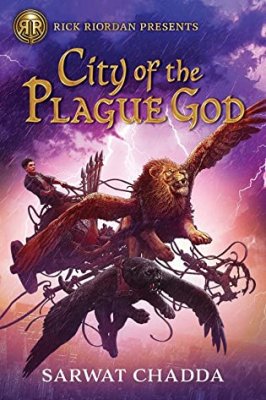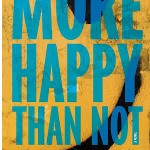 City of the Plague God by Sarwat Chadda
City of the Plague God by Sarwat Chadda Published by Rick Riordan Presents on January 12, 2021
Genres: Middle Grade, Fantasy
Pages: 400
Source: NetGalley
Cover Artist: Kerem Beyit
My content rating: MG (Death of a family member; Some violence)
My rating:

Best-selling author Rick Riordan presents CITY OF THE PLAGUE GOD, an adventure based on ancient Mesopotamian mythology written by Sarwat Chadda, author of the Ash Mistry series. Characters from the Epic of Gilgamesh populate this high-stakes contemporary adventure in which all of Manhattan is threatened by the ancient god of plagues.
Thirteen-year-old Sik wants a simple life going to school and helping at his parents' deli in the evenings. But all that is blown to smithereens when Nergal comes looking for him, thinking that Sik holds the secret to eternal life.Turns out Sik is immortal but doesn't know it, and that's about to get him and the entire city into deep, deep trouble.
Sik's not in this alone. He's got Belet, the adopted daughter of Ishtar, the goddess of love and war, on his side, and a former hero named Gilgamesh, who has taken up gardening in Central Park. Now all they have to do is retrieve the Flower of Immortality to save Manhattan from being wiped out by disease. To succeed, they'll have to conquer sly demons, treacherous gods, and their own darkest nightmares.
![]()
One grade school memory that stands out most vividly for me is the huge project I did on Mesopotamia when I was probably in about fifth grade or so. I was entranced by all things Mesopotamian—the culture, the mythology, the political landscape, even the geography. Now, I’ll confess that I don’t remember a whole lot of it anymore, but all these (many) years later, something still thrills within me at the mere mention of the region. So, when I realized that this book was based on the gods of ancient Mesopotamia, I was incredibly excited!
This book is told from the unique perspective of a Muslim boy. Recently, I’ve read MG and YA stories told from Muslim POVs, but all of them have been from a girls’ perspective. The male perspective gives a surprisingly different dynamic. Chadda doesn’t shy away from the fact that Muslim men don’t ever get to be the heroes in Western stories—a fact that is addressed directly throughout the book. He also uses the word jihad to describe the characters’ struggles. I will fully confess that I read this word and internally flinched. I’ve never heard it used in anything but a negative light, and it’s obvious that Chadda is well aware of those negative associations and he’s working to counteract them. I honestly appreciated this reminder (and repudiation) of my own cultural biases.
As I said, the MC is a teenage boy. The story follows Sik, a thirteen-year-old boy who grew up hearing stories of the epic hero Gilgamesh and his many mighty deeds. When Sik’s brother dies while on a trip to Iraq, Sik feels like his family is broken in ways that can’t be fixed. He pours his time and energy into his family’s deli, but he feels like nothing he can ever do can make up for the loss they’ve experienced. Then one day, the Mesopotamian plague god shows up at his door, insisting that Sik has something precious in his possession from Sik’s brother. He destroys the deli and infects Sik’s parents (and, soon, the rest of Manhattan) with a deadly disease. Sik teams up with the goddess of love and war (and her daughter Belet) to try and defeat the plague god.
One of my favorite aspects of this book is how seamlessly Chadda interweaves many seemingly unrelated elements. Tiny details from the beginning of the story become important later. For instance, Sik completely misunderstands and misjudges his brother’s best friend, a character who becomes vitally important by the end of the book, and seemingly bothersome details about him transform into something new by the end. The story explores the themes of love and loss, family, friendships, and what it means to fight for your homeland and those you love. It’s also full of adventure that will appeal to Rick Riordan Presents’ typical fans.
I truly hope this turns into a series so we can follow Sik’s and Belet’s further adventures!!
***Disclosure: I received this book from the publisher via NetGalley for review purposes. No other compensation was given and all opinions are my own.***
About The Author
 Sarwat Chadda has lived and traveled throughout the world, from China to Guatemala. He’s been lost in Mongolia, abandoned at a volcano in Nicaragua and hidden up a tree from a rhino in Nepal. Not to mention being detained by Homeland Security in the US and chased around Tibet by the Chinese police. Maybe he just has that sort of face.
Sarwat Chadda has lived and traveled throughout the world, from China to Guatemala. He’s been lost in Mongolia, abandoned at a volcano in Nicaragua and hidden up a tree from a rhino in Nepal. Not to mention being detained by Homeland Security in the US and chased around Tibet by the Chinese police. Maybe he just has that sort of face.
Anyway, now he’s trying to settle in one place and stay out of trouble. Hence his new career as a writer. It’s safe, indoors and avoids any form of physical danger.
Throughout his travels, Sarwat has soaked up the myths, legends and cultures of faraway places. Isn’t it about time you met them too?










This is quite interesting. I’ve also never heard anyone used jihad in anything other than negative. It goes to show that educating ourselves should be a never ending goal. Admittedly, I know nothing about Mesopotamia, so it will be interesting to learn more about their gods and myths.
This seems awesome! I’m actually just learning about Mesopotamia now in an Ancient History course, so this definitely seems like a book I’d be interested in.
This sounds great! I don’t know much about the mythology in this one, but I love the idea of Gilgamesh retiring to be a gardener. (Honestly, I love stories about retired heroes in general.) Thanks for the review!
Wow that author has an interesting story. He may consider a memoir soon. I’ll note him for future reference.
The Rick Riordan Presents series is consistently good. I loved the Sal and Gabi books and Tristan Strong, and this one looks just as fun. So great to see a successful writer paying it forward and supporting more diversity in kids books!
[…] City of the Plague God by Sarwat Chadda (I’m not counting Legendborn, since I already listed that one in my best […]